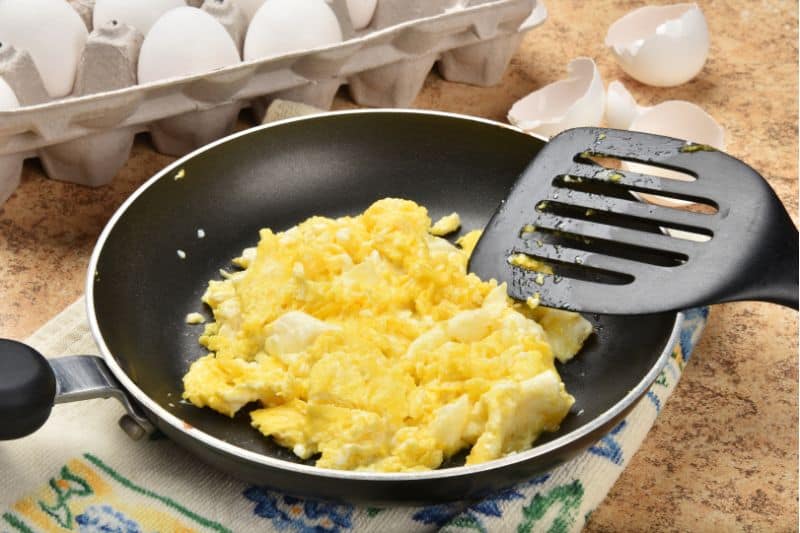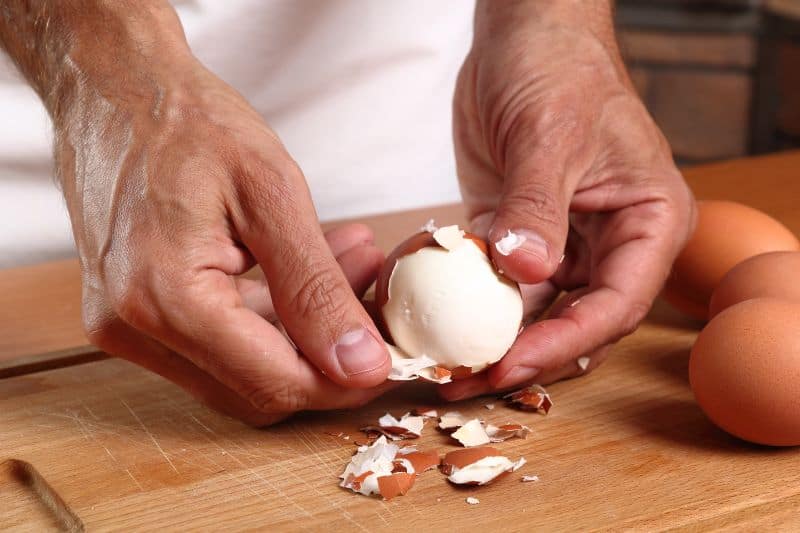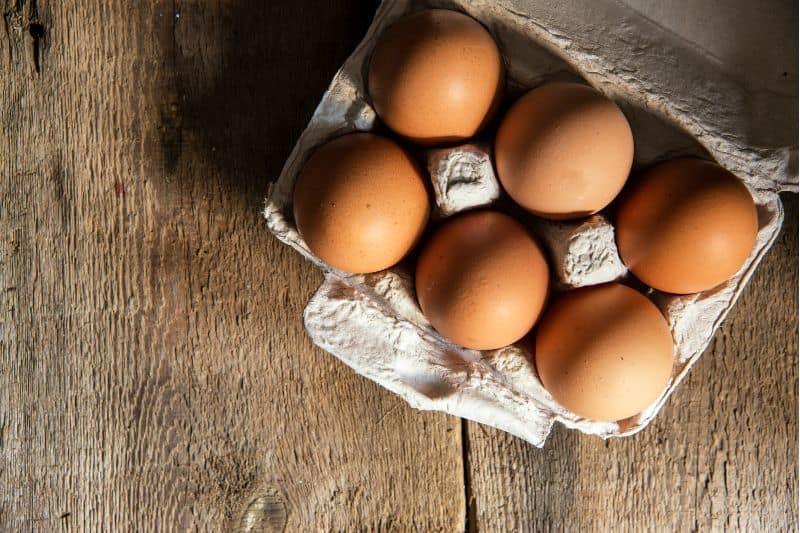All life is believed and understood to begin from somewhere. This is mainly through the process of mitosis or reproduction.
In the latter, an egg, primarily released by the female, is fertilized by sperm released by the male. Eggs are laid by many species including birds, reptiles, a few mammals and fish, the majority of which have been eaten by humans for thousands of years.
Chicken eggs are known to be very nutritious, containing vitamins and minerals that are an essential part of a healthful diet. They are also consumed alone either raw, scrambled, cooked or boiled. They can also be incorporated into other dishes like baked meals.
But have you ever wondered whether eggs can be composted?
Well, this article will be examining just that. So, if you’re wondering whether eggs can play a part in your compost, you’re in the right place. Keep reading for more!
Can You Put Whole Eggs in The Compost?
Certainly, you can compost eggs, although you have to use the correct methods. All organic matter, including eggs, eventually decomposes. Compost takes all those unwanted scraps of organic waste matter and makes them useful.
Composting ingredients are often referred to as “greens” and “browns,” indicating whether they are primarily nitrogen- or carbon-based respectively. Most greens, or the high-nitrogen compostable items, are moist and include vegetable scraps, grass clippings and of course raw eggs.
On the other hand, browns, now the high-carbon compostable items, are usually dry and include dry autumn leaves, cardboard and sawdust. The contents of a composting bin should be moist, but not sopping wet and the composter should be aerated properly. When all these conditions are properly in place, it helps the raw eggs compost successfully
The main argument against composting raw eggs are the concerns about pest control and the smell. While decomposing raw eggs, the process will release some stinky odors which are disgusting to humans.
On the flip side, these odors can be very attractive to pests. They will come and try to break in so that they eat the food for themselves. As such, the preferred composting bin has to be enclosed. This will provide you with a higher success rate of the compost while at the same time deterring animal pests from making a mess of your compost.
Also, like other food scraps, try and bury the eggs in the middle of the pile. This will ensure they compost quickly as the middle of the pile is hot enough. It will also ensure the smells are not too strong for you and will therefore not attract many pests.
If you have a tumbling compost bin, turn it a few times after adding the eggs so that they are more evenly distributed throughout your compost. No matter what type of compost bin you have, turn it daily if possible so that it decomposes more quickly.
The more quickly items in your compost bin decompose, the less inviting they are to animal pests, and the quicker you can use the compost in your garden. The other reason behind turning the composter is because eggs are quite potent and you should not allow them to concentrate in one small area.
Also for improved results, add only a few raw eggs to your compost at a time, and only in tandem with an equal amount of high-carbon compostable materials.
Finally, add some hydrated white lime to neutralize the acids inside the composter and encourages full decomposition. White lime also keeps the nosy rodents and flies away and also accelerates the rotting process.

Can You Compost Scrambled Eggs?
Oh, yes you can. You can compost scrambled eggs, primarily because anything that can be eaten, can be composted. Scrambled eggs are made using butter and other ingredients like milk, water, cream and even grated cheese. All these ingredients are compostable by themselves and also combined.
However, a lot of caution is advised because of the obvious pest problems. You see, scrambled eggs, much like raw eggs, have the pest problem associated with them. They may attract rodents, flies, and sometimes larger animals like raccoons, which may bring down the whole set up.
Therefore, your compost bin should be enclosed at all times to avoid such destructions. Enclosing not only keep the smell from getting to rodents and other animals but also keeps it from humans and the environment generally.
But then, keep in mind that animal products like dairy and scrambled eggs have associated bacteria problems. They may be infected with Salmonella and E. coli that can make one ill. And when added to the compost, the bacteria will spread throughout the compost and will subsequently be transferred to the growing plants in your garden.
But as long as you have the right measures in place, then that’s something you need not worry about.
Can You Compost Cooked Eggs?
Yes, like raw eggs, cooked eggs can also be composted. However, take caution as doing so attracts some dangers.
First, by cooked eggs, most of the time you will be referring to eggs cooked using cooking oil. Cooking oil and other fats have the potential to slow down the decomposition process. Therefore, strain out the egg particles and save the oil in a sealed container or discard it in the trash if it is spent.
Alternatively, use small quantities of cooking oil when cooking and have a less troubled time trying to compost them.
Secondly, any cooked food has the potential of attracting vermin, rodents and other pests who can do absolutely anything to enter the composting bin. So again, place the eggs at the center of the composting pile to hasten decomposition and hide their smell from the rodents.
And, of course, remember to chop the cooked eggs into smaller pieces so that they may decompose quickly.
But then, it’s worth mentioning that composting cooked eggs may result in an anaerobic reaction. The meats and cooked eggs can produce anaerobic bacteria, which is the archenemy of a normal, aerobic compost pile. These bacteria will interfere with the composting process and cause problems with odors and acidity.
To avoid this, be careful about these foods or go anaerobic fully. Anaerobic fermenting systems, such as Bokashi bins, use special bacteria in an airtight container. These types of composting systems can quickly and effectively break down meat and dairy scraps, although the resulting compost is more acidic than regular or aerobic compost.

Can You Compost Hard Boiled Eggs?
Yes, you can add hard-boiled eggs to your compost. Most of those who argue against this cite the fact that the hard-boiled eggs, like other meats, dairy products and whole eggs, will attract rodents and cause odors as they decompose.
Although they are right, this can be mitigated. You can add the eggs together with the eggshells. This way, they remain less odorless and will decompose all the same. Without the odors, not many rodents or pests will be attracted.
If you don’t want to include shells in the equation, you can consider burying the hard-boiled eggs in the center of the pile. The matter surrounding the eggs will mask the odors and the pests will not be invited. Plus, the middle of the composting pile is also the hottest part of the composting pile, meaning they decompose quite quickly.
You can also crush the hard-boiled eggs into finer particles, something which will ensure the composting process goes on well and quickly. With regards to hard-boiled eggshells, they contain a high amount of calcium, which plants love.
The hard-boiled eggshells can also be composted and the hard-boiled-egg water is also good for the plants. Of course, you are not going to get as much calcium from the water, itself, but grinding up the eggshells and adding them to the soil will make the soil more calcium-rich as well.
When decomposing hard-boiled eggs, you can also sprinkle some white lime on them. It keeps the flies away, deters rodents, accelerates the rotting process, and neutralizes acids that might be present in the compost and may hinder a proper and full decomposition.
Can You Compost Egg Yolks?
You can compost egg yolks, the same way you would compost egg whites or the entire raw egg. Some people tend to eat the egg whites and leave out the yolks, which means they will be thrown away.
If they end up in the trash, they will find their resting place in landfills, which contributes to environmental pollution. Composting them is a viable option that not only takes care of your trash but also adds positive substance to your garden and crops.
Add the egg yolks to the composting bin and place them in the middle so that they might decompose quite quickly. As they decompose, they will release some foul odors which could attract vermin, pests and rodents, which is why you need them in the middle of the pile.
And yes, keep in mind that burying them in the soil is very different from composting. Burying them directly into the soil without composting them would mean raccoons and other pests will dig up everything to get to them. This will be done at the expense of your compound, garden and crops.
Therefore, if you have extra egg yolks that are probably gone bad, just compost them. Egg whites also follow the same procedure of composting as egg yolks. Just ensure you cover them as properly as possible so that they do not attract vermin, or produce bad odors that can affect your peaceful stay within your compound.

How Long Does It Take For Eggs To Compost?
It is not easy to arrive at a definitive answer as to how long it takes for eggs to decompose. Eggs on their own might take a short time to decompose, maybe because it is the raw food.
The problem with determining how long it can take before they decompose is if the eggs were placed inside the pile or simply place on top. If placed inside, it can take a few days but if placed on top, it can take a bit longer.
Where the eggs were cooked, scrambled or boiled, the process might take a short time as well. Where the eggshells are composted inside a compost bin or tumbler, they might take up to 4 weeks to decompose. While you do not need to crush eggshells before composting them, doing so will speed up how fast the eggshells break down in the compost.
Where the eggshells are buried as a form of decomposition, this might take a bit longer. In a study in which large eggshell pieces were buried in a balanced soil medium and dug up after one year, examined, reburied, and dug up to examine again after three years, the eggshells showed no signs of decomposition after either one or even three years underground.
As such, it is hard to answer exactly how long it will take for eggshells to compost, but based on the three-year study, it seems that eggshells decompose incredibly slowly and possibly even not at all.
References:
https://www.medicalnewstoday.com/articles/283659
https://ask2.extension.org/kb/faq.php?id=415205
https://www.houzz.com/discussions/1598615/can-i-compost-cooked-egg-yolk
https://adebayothevoice.com/qa/quick-answer-can-hard-boiled-eggs-be-composted.html






